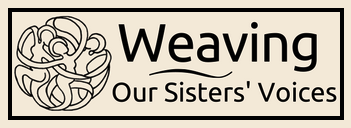Comments from Dr. Ann Ciasullo
"Linda Schearing’s Weaving Our Sisters’ Voice offers a powerful message: the message that women’s voices have been silenced for too long, and that their stories must be heard. This insistence on female storytelling deeply compelling. As any good reader knows, stories have the power to transform; they take us to times, lands, and experiences that we may never have, and as such they expand our world. But if certain stories are told over and over again, and others are not, then that world becomes limited. Indeed, if all we see and hear are narratives that feature a male protagonist who struggles against societal norms (here think of Huck Finn, Jay Gatsby, or Holden Caufield, or even Frederick Douglass) or who saves his community or world or universe from destruction (think of Harry Potter, Luke Skywalker, or Superman), then we soon believe that the only people whose stories matter are men.
"Most of the time this belief is unconscious. Weaving Our Sisters’ Voices reminds us that the narratives we privilege in our culture are typically not those of women. And then, if we look deeper, we start to see that in literature and popular culture alike, women generally are understood to be, and perhaps expected to be, objects, not subjects. The women in Weaving Our Sisters’ Voices acutely understand what it means to be an object. They know they are seen, in the words of the play, as “property” and “possessions,” a fact demonstrated most effectively and disturbingly in the Levite woman’s rape and murder. Poet and essayist Adrienne Rich, her in book Of Woman Born, makes one of the most profound assertions regarding female objectification: “The woman’s body,” Rich claims, “is the terrain on which patriarchy is erected.” This play, in telling the story of the Levite woman, powerfully underscores this assertion. At the same time, Weaving Our Sisters’ Voices presents us with women like Vashti who refuse this objectification, women who in saying “no” declare their right to be subjects, not objects. In doing so, they are making a profoundly feminist statement about what it means to be human. It means that women do not belong to anyone but themselves. It means women have the capacity for thought, spirituality, and leadership that they have long been denied. And it means that they have a voice—a voice at once individual and collective—that demands to be heard, demands to tell another side of the same old, well-worn stories.
"Perhaps the bravest parts of this script is its recognition of, and its giving voice to, anger. Culturally, anger is a dangerous emotion, an emotion that is often reserved for men; anger in women is typically discouraged, if not mocked; if a woman shows anger, she is often dismissed as “overly emotional” or a “feminazi.” In this play, though, Job’s wife is angry; Tamar is angry; and, in the words of the conclusion, the anger of these women “gives us strength/To combat injustice.” In considering this line, it’s important to recognize that anger is not the same as hatred. Hatred, according to the feminist poet Audre Lorde, “is the fury of those who do not share our goals, and its object is death and destruction.” Anger, in contrast, is a “grief of distortions between peers, and its object is change.” Grief that leads to change, suffering that leads to realization—such movements from injustice to personal and social transformation are made possible in large part by allowing the voices of grief and suffering to be heard. Writer Maya Angelou once stated that “there is no agony like bearing an untold story inside of you.” Weaving Our Sisters’ Voices tells those untold stories, and it doing so, it invites us to sit down, listen, and learn."
